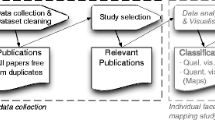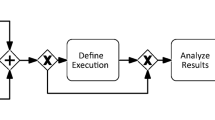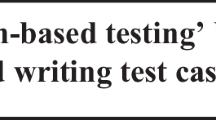Abstract
Background
Several researchers have criticized the standards of performing and reporting empirical studies in software engineering. In order to address this problem, Jedlitschka and Pfahl have produced reporting guidelines for controlled experiments in software engineering. They pointed out that their guidelines needed evaluation. We agree that guidelines need to be evaluated before they can be widely adopted.
Aim
The aim of this paper is to present the method we used to evaluate the guidelines and report the results of our evaluation exercise. We suggest our evaluation process may be of more general use if reporting guidelines for other types of empirical study are developed.
Method
We used a reading method inspired by perspective-based and checklist-based reviews to perform a theoretical evaluation of the guidelines. The perspectives used were: Researcher, Practitioner/Consultant, Meta-analyst, Replicator, Reviewer and Author. Apart from the Author perspective, the reviews were based on a set of questions derived by brainstorming. A separate review was performed for each perspective. The review using the Author perspective considered each section of the guidelines sequentially.
Results
The reviews detected 44 issues where the guidelines would benefit from amendment or clarification and 8 defects.
Conclusions
Reporting guidelines need to specify what information goes into what section and avoid excessive duplication. The current guidelines need to be revised and then subjected to further theoretical and empirical validation. Perspective-based checklists are a useful validation method but the practitioner/consultant perspective presents difficulties.
Categories and Subject Descriptors
K.6.3 [Software Engineering]: Software Management—Software process.
General Terms
Management, Experimentation.
Similar content being viewed by others
References
Abdelnabi Z, Cantone G, Ciolkowski M, Rombach D (2004) Comparing code reading techniques applied to object-oriented software frameworks with regard to effectiveness and defect detection rate Proceedings ISESE 04.
Abrahao S, Poels G, Pastor O (2004) Assessing the reproducibility and accuracy of functional size measurement methods through experimentation, Proceedings ISESE 04.
Dybå T, Kampenes VB, Sjøberg DIK (2006) A systematic review of statistical power in software engineering experiments. Inf Softw Technol 48(8):745–755
Harris P (2002) Designing and reporting experiments in psychology, 2nd edn. Open University Press.
Hartley J (2004) Current findings from research on structured abstracts. J Med Libr Assoc 92(3):368–371
Jedlitschka A, Pfahl D (2005) Reporting guidelines for controlled experiments in software engineering. IESE-Report IESE-035.5/E
Kitchenham B (2004) Procedures for performing systematic reviews. Joint Technical Report, Keele University TR/SE-0401 and NICTA 0400011T.1, July
Kitchenham B, Pfleeger SL, Pickard L, Jones P, Hoaglin D, El Emam K, Rosenberg J (2002) Preliminary guidelines for empirical research in software engineering. IEEE Trans Softw Eng 28(8):721–734
Kitchenham B, Al-Khilidar H, Ali Babar M, Berry M, Cox K, Keung J, Kurniawati F, Staples M, Zang H, Zhu L (2006) Evaluating guidelines for empirical software engineering studies, ISESE06, Brazil
Moher D, Schultz KF, Altman D (2001) The CONSORT statement: revised recommendations for improving the quality of reports of parallel-group randomized trials. Lancet 357:1191–1194, April 14
Pickard LM, Kitchenham BA, Jones P (1998) Combining empirical results in software engineering. Inform Softw Technol 40(14):811–821
Schroeder PJ, Bolaki P, Gopu V (2004) Comparing the fault detection effectiveness of N-way and random test suites, Proceedings ISESE 04
Sjøberg DIK, Hannay JE, Hansen O, Kampenes VB, Karahasanovic A, Liborg N-K, Rekdal AC (2005) A survey of controlled experiments in software engineering. IEEE Trans Softw Eng (9):733–753, September 31
Shull Forest, Rus Ionna, Basili Victor (2000) How perspective-Reading can Improve Requirements Inspection. IEEE Computer 73–78, July
Verelst Jan (2004) The influence of the level of abstraction on the evolvability of conceptual models of information systems. Proceedings ISESE 04
Wohlin C, Runeson P, Höst M, Regnell B, Wesslén A (2000) Experimentation in software engineering. An introduction. Kluwer Academic Publishers
Wohlin C, Petersson H, Aurum A (2003) Combining data from reading experiments in software inspections. In: Juristo N, Moreno A (eds) Lecture notes on empirical software engineering. World Scientific Publishing
Acknowledgement
NICTA is funded through the Australian Government’s Backing Australia’s Ability initiative, in part through the Australian Research Council.
Author information
Authors and Affiliations
Corresponding author
Additional information
Editor: Jose Carlos Maldonado
M. Ali Babar was working with the National ICT Australia when the reported work was performed.
Appendix
Rights and permissions
About this article
Cite this article
Kitchenham, B., Al-Khilidar, H., Babar, M.A. et al. Evaluating guidelines for reporting empirical software engineering studies. Empir Software Eng 13, 97–121 (2008). https://doi.org/10.1007/s10664-007-9053-5
Received:
Accepted:
Published:
Issue Date:
DOI: https://doi.org/10.1007/s10664-007-9053-5




